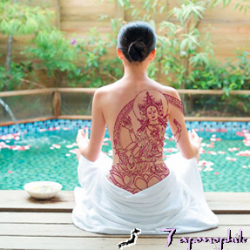Right livelihood
Right livelihood (sammā ājīva) is the fifth step on the Buddha’s Noble Eightfold Path. Livelihood is the work we do in order to live. To be ‘right’ in the full sense of the word, a livelihood would
(1) have to provide one with at least one’s basic needs,
(2) it would have to be in accordance with ethical principles and
(3) it would have to make a useful and indeed a beneficial contribution to society.
The Buddha mentioned as examples of wrong livelihood, dealing in weapons, human beings (slavery, people smuggling, certain types of prostitution and living off the income generated by it), trade in flesh, manufacturing and selling alcohol and poisons (A.III,207). Today this list could be increased considerably. The Buddha said that to be ‘learned and skilled in one’s craft’ (bāhusaccañ ca sippañ ca) is a great blessing (Sn.261). He described a wholesome and honest income as being ‘earned by hard work, by strength of arm and sweat of brow, honestly and lawfully’ (A.II,67). For example, whether living off investments would be a right or wrong livelihood would depend on what one’s money was invested in. We would normally think of being a doctor, a nurse or a teacher as being right livelihoods but again, it would depend just how these professions were practised. So right livelihood is not just what type of work we do, but also how we do our work.
Right livelihood (samyag-ājīva / sammā-ājīva). This means that practitioners ought not to engage in trades or occupations which, either directly or indirectly, result in harm for other living beings. In the Chinese and Pali Canon, it is explained thus:
And what is right livelihood? There is the case where a disciple of the noble ones, having abandoned dishonest livelihood, keeps his life going with right livelihood: This is called right livelihood.
More concretely today interpretations include "work and career need to be integrated into life as a Buddhist," it is also an ethical livelihood, "wealth obtained through rightful means" (Bhikku Basnagoda Rahula) - that means being honest and ethical in business dealings, not to cheat, lie or steal. As people are spending most of their time at work, it’s important to assess how our work affects our mind and heart. So important questions include "How can work become meaningful? How can it be a support, not a hindrance, to spiritual practice — a place to deepen our awareness and kindness?"
The five types of businesses that should not be undertaken:
Business in weapons: trading in all kinds of weapons and instruments for killing.
Business in human beings: slave trading, prostitution, or the buying and selling of children or adults.
Business in meat: "meat" refers to the bodies of beings after they are killed. This includes breeding animals for slaughter.
Business in intoxicants: manufacturing or selling intoxicating drinks or addictive drugs.
Business in poison: producing or trading in any kind of poison or a toxic product designed to kill.
Work as a Spiritual Practice, Lewis Richmond, 1999.
